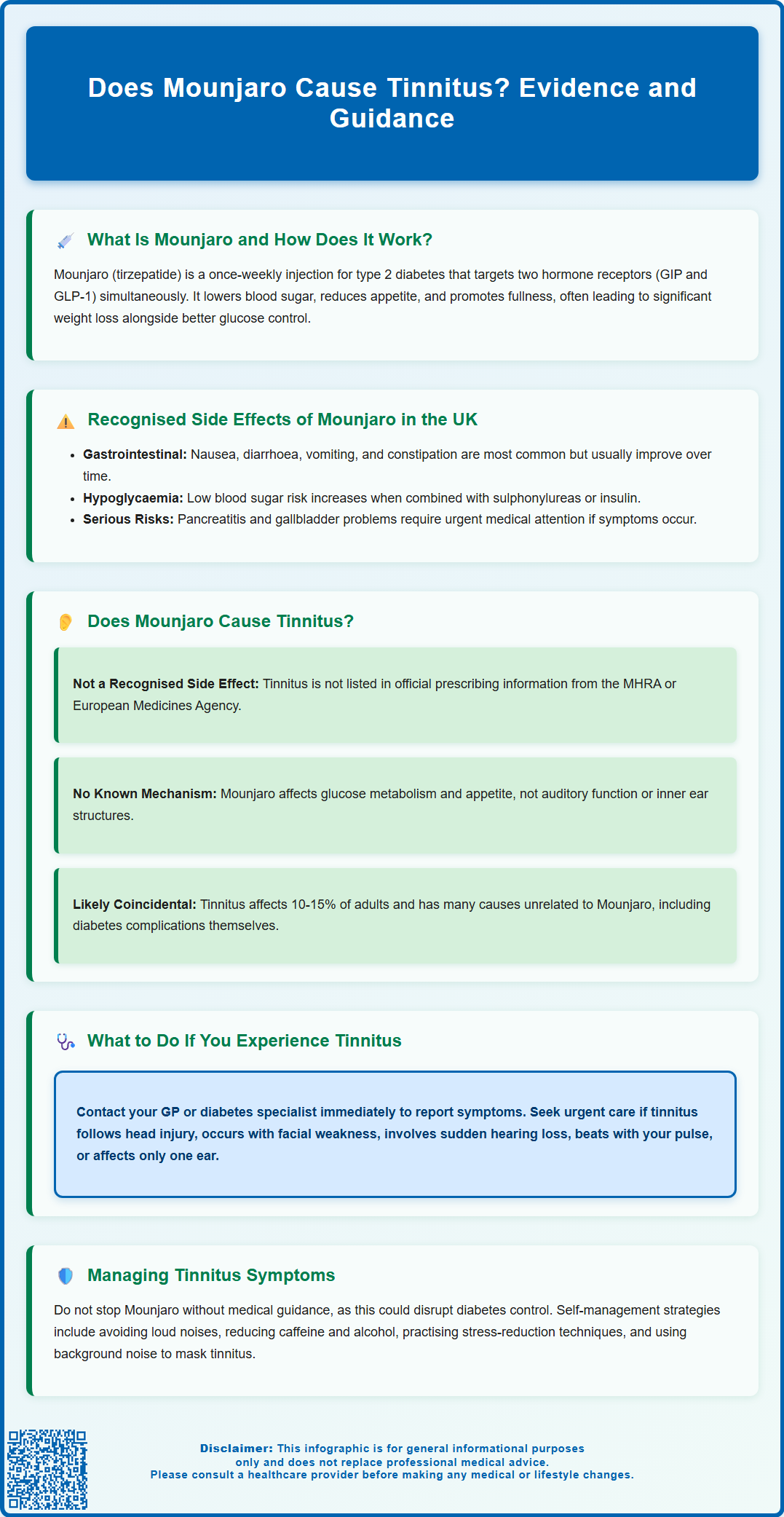Mounjaro (tirzepatide) is a once-weekly injection licensed in the UK for treating type 2 diabetes in adults. As a dual GIP and GLP-1 receptor agonist, it works by enhancing insulin secretion, suppressing glucagon release, slowing gastric emptying, and reducing appetite. Whilst Mounjaro is generally well tolerated, patients may experience side effects—most commonly gastrointestinal symptoms such as nausea, diarrhoea, and vomiting. Some individuals have questioned whether Mounjaro might cause tinnitus (ringing in the ears). This article examines the evidence, explores recognised side effects, and provides guidance on what to do if you experience tinnitus whilst taking this medication.
Summary: Tinnitus is not a recognised side effect of Mounjaro (tirzepatide) according to UK regulatory documentation, and there is no established pharmacological mechanism linking the medication to ringing in the ears.
- Mounjaro (tirzepatide) is a dual GIP and GLP-1 receptor agonist licensed in the UK for type 2 diabetes treatment, administered as a once-weekly subcutaneous injection.
- The most common side effects are gastrointestinal (nausea, diarrhoea, vomiting, constipation), typically mild to moderate and improving over time with dose titration.
- Tinnitus is not listed in the Summary of Product Characteristics approved by the MHRA or EMA, and no direct pharmacological link exists between tirzepatide and auditory symptoms.
- Tinnitus affects 10–15% of adults and can arise from numerous causes including age-related hearing loss, noise exposure, ear infections, cardiovascular conditions, and certain medications.
- Patients with type 2 diabetes may have additional tinnitus risk factors due to microvascular changes affecting inner ear circulation.
- If tinnitus develops whilst taking Mounjaro, contact your GP for assessment—do not stop the medication without medical advice, as this may affect diabetes control.
Table of Contents
What Is Mounjaro and How Does It Work?
Mounjaro (tirzepatide) is a prescription medicine licensed in the UK for the treatment of type 2 diabetes mellitus in adults. It is administered as a once-weekly subcutaneous injection and belongs to a novel class of medications known as dual glucose-dependent insulinotropic polypeptide (GIP) and glucagon-like peptide-1 (GLP-1) receptor agonists. By targeting both of these incretin hormone receptors simultaneously, Mounjaro offers a unique mechanism of action that distinguishes it from other diabetes treatments.
The mechanism of action of tirzepatide involves several complementary pathways that work together to improve glycaemic control. When blood glucose levels rise after eating, Mounjaro stimulates insulin secretion from pancreatic beta cells in a glucose-dependent manner, meaning insulin release only occurs when blood sugar is elevated. Simultaneously, it suppresses the release of glucagon—a hormone that raises blood glucose—from pancreatic alpha cells. This dual action helps to regulate blood sugar levels more effectively throughout the day.
Beyond its effects on insulin and glucagon, Mounjaro also slows gastric emptying, which means food moves more slowly from the stomach into the small intestine. This contributes to improved post-meal glucose control and promotes a feeling of fullness. Additionally, tirzepatide acts on appetite-regulating centres in the brain, reducing hunger and food intake. These combined effects often result in significant weight loss alongside improved glycaemic control.
Recognised Side Effects of Mounjaro in the UK
Like all medicines, Mounjaro can cause side effects, although not everyone will experience them. The most commonly reported adverse effects are gastrointestinal in nature and are generally dose-dependent. According to the Summary of Product Characteristics (SmPC) approved by the Medicines and Healthcare products Regulatory Agency (MHRA), the most frequent side effects include:
-
Nausea – very common, often most pronounced when starting treatment or increasing the dose
-
Diarrhoea – very common, can range from mild to moderate in severity
-
Vomiting – very common, may occur particularly during dose escalation
-
Constipation – very common, affects a significant proportion of patients
-
Abdominal pain or discomfort – common, typically transient
-
Decreased appetite – very common, related to the medication's mechanism of action
These gastrointestinal symptoms are usually mild to moderate and tend to improve over time as the body adjusts to the medication. Starting at a low dose and following the recommended titration schedule can help minimise these effects. It is important to maintain adequate hydration, particularly if experiencing diarrhoea or vomiting, as severe gastrointestinal symptoms can lead to dehydration and acute kidney injury.
Other recognised side effects include injection site reactions such as redness, itching, or swelling at the injection site. There is also a risk of hypoglycaemia (low blood sugar), particularly when Mounjaro is used in combination with other glucose-lowering medications such as sulphonylureas or insulin. Patients should be aware of the symptoms of hypoglycaemia, which include trembling, sweating, confusion, and palpitations. Mounjaro may also cause small increases in heart rate.
More serious but less common adverse effects include pancreatitis (inflammation of the pancreas), which presents with severe, persistent abdominal pain that may radiate to the back. There have also been reports of gallbladder problems, including cholelithiasis (gallstones) and cholecystitis (gallbladder inflammation). Patients experiencing severe, persistent upper abdominal pain, with or without vomiting, or jaundice should seek urgent medical attention.
Patients with pre-existing diabetic retinopathy should be monitored closely, as rapid improvements in blood glucose control may be associated with temporary worsening of diabetic retinopathy.
If you suspect you have experienced a side effect from Mounjaro, you can report it to the MHRA through the Yellow Card Scheme (yellowcard.mhra.gov.uk or via the Yellow Card app).

Does Mounjaro Cause Tinnitus?
Tinnitus—the perception of ringing, buzzing, or other sounds in the ears without an external source—is not listed as a recognised side effect of Mounjaro in the official prescribing information approved by the MHRA or the European Medicines Agency (EMA). The Summary of Product Characteristics for tirzepatide does not include tinnitus among the documented adverse reactions observed in clinical trials or post-marketing surveillance data.
It is important to understand that there is no established pharmacological mechanism by which Mounjaro would be expected to cause tinnitus. The drug's action on GIP and GLP-1 receptors primarily affects glucose metabolism, insulin secretion, gastric emptying, and appetite regulation. These pathways do not have direct connections to auditory function or the structures of the inner ear that would typically be implicated in tinnitus.
However, the absence of tinnitus from official documentation does not mean that patients taking Mounjaro cannot experience this symptom. Tinnitus is a relatively common condition in the general population, affecting approximately 10–15% of adults at some point in their lives. It can arise from numerous causes, including age-related hearing loss, exposure to loud noise, ear infections, earwax build-up, cardiovascular conditions, stress, and certain medications (particularly ototoxic drugs such as high-dose aspirin, some antibiotics, and loop diuretics).
Patients with type 2 diabetes may have additional risk factors for tinnitus. Diabetes can affect blood circulation to the small vessels in the inner ear, and some studies have suggested a possible association between diabetes and hearing problems, including tinnitus. Therefore, if tinnitus develops while taking Mounjaro, it may be coincidental rather than causally related to the medication. It could reflect underlying diabetes-related microvascular changes, other concurrent medications, or entirely separate causes. At present, there is no official link between Mounjaro and tinnitus based on available clinical evidence.
What to Do If You Experience Tinnitus While Taking Mounjaro
If you develop tinnitus or notice ringing in your ears while taking Mounjaro, it is important to take appropriate steps to investigate and manage the symptom. While there is no established connection between tirzepatide and tinnitus, any new or persistent symptom warrants medical attention to rule out other potential causes and ensure your overall health and wellbeing.
First, contact your GP or diabetes specialist to report the symptom. Your healthcare provider will take a detailed history to understand the characteristics of your tinnitus—when it started, whether it is constant or intermittent, whether it affects one or both ears, and whether it is accompanied by other symptoms such as hearing loss, dizziness, ear pain, or discharge. This information helps to narrow down potential causes.
Your doctor may perform a physical examination of your ears to check for obvious problems such as earwax impaction, infection, or structural abnormalities. They will also review your complete medication list, as tinnitus can be a side effect of various drugs. If you are taking other medications known to cause tinnitus, your doctor may consider whether adjustments are needed.
Certain symptoms require urgent medical attention. Seek immediate medical care if you experience tinnitus following a head injury or with neurological symptoms such as facial weakness or numbness. Urgent referral (within 2 weeks) is needed for sudden hearing loss with tinnitus that developed within the last 30 days, pulsatile tinnitus (tinnitus that beats in time with your pulse), or unilateral tinnitus with asymmetrical hearing loss.
Depending on the findings, your GP may refer you to an ear, nose, and throat (ENT) specialist or an audiologist for further assessment. This might include hearing tests (audiometry) to evaluate your hearing function, which is typically recommended for persistent tinnitus or asymmetrical symptoms. If there are concerning features, imaging studies may be considered.
Do not stop taking Mounjaro without consulting your healthcare provider, as abrupt discontinuation could affect your diabetes control. If your doctor suspects that Mounjaro might be contributing to your symptoms—though this would be unusual—they will discuss alternative treatment options with you. In the meantime, there are self-management strategies that may help reduce the impact of tinnitus, such as avoiding loud noise exposure, reducing caffeine and alcohol intake, managing stress through relaxation techniques, and using background noise or white noise to mask the tinnitus, particularly at night. Your healthcare team can provide guidance tailored to your individual circumstances and ensure that any underlying causes are appropriately addressed.
Frequently Asked Questions
Is tinnitus a recognised side effect of Mounjaro?
No, tinnitus is not listed as a recognised side effect in the official prescribing information for Mounjaro (tirzepatide) approved by the MHRA or EMA. There is no established pharmacological mechanism linking tirzepatide to auditory symptoms.
What are the most common side effects of Mounjaro?
The most common side effects of Mounjaro are gastrointestinal, including nausea, diarrhoea, vomiting, constipation, abdominal discomfort, and decreased appetite. These symptoms are typically mild to moderate and often improve over time with gradual dose titration.
What should I do if I develop tinnitus whilst taking Mounjaro?
Contact your GP or diabetes specialist to report the symptom and undergo assessment to identify potential causes. Do not stop taking Mounjaro without medical advice, as this may affect your diabetes control. Your doctor will review your medications, examine your ears, and arrange further investigations or referral if needed.
The health-related content published on this site is based on credible scientific sources and is periodically reviewed to ensure accuracy and relevance. Although we aim to reflect the most current medical knowledge, the material is meant for general education and awareness only.
The information on this site is not a substitute for professional medical advice. For any health concerns, please speak with a qualified medical professional. By using this information, you acknowledge responsibility for any decisions made and understand we are not liable for any consequences that may result.
Heading 1
Heading 2
Heading 3
Heading 4
Heading 5
Heading 6
Lorem ipsum dolor sit amet, consectetur adipiscing elit, sed do eiusmod tempor incididunt ut labore et dolore magna aliqua. Ut enim ad minim veniam, quis nostrud exercitation ullamco laboris nisi ut aliquip ex ea commodo consequat. Duis aute irure dolor in reprehenderit in voluptate velit esse cillum dolore eu fugiat nulla pariatur.
Block quote
Ordered list
- Item 1
- Item 2
- Item 3
Unordered list
- Item A
- Item B
- Item C
Bold text
Emphasis
Superscript
Subscript










